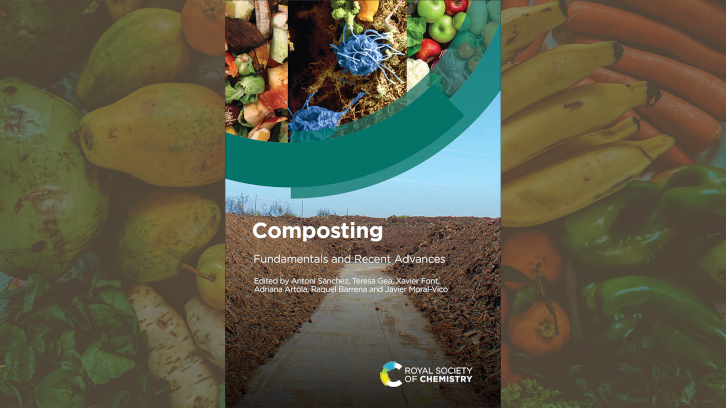From Origins to Advances: A Comprehensive Guide to Understanding and Practicing Composting

The UAB Composting Research Group (GICOM) has published the book: "Composting: Fundamentals and Recent Advances". The book is designed to be accessible to people interested in the process at different levels, from undergraduate and master's students to professionals in the environmental sector. It is a combination of fundamentals, updates and new strategies for understanding and practicing composting.
This new book on composting is the result of the enormous effort made by many people from different fields: universities, companies, consultancies, public administrations, etc., from all over the world, although mainly Spanish. People who firmly believe in composting as a sustainable way to treat the waste we generate, and who once again confirm that Spain is one of the countries where this technology has the most relevance, from research to full-scale implementation.
Furthermore, this book was written with a very clear objective: to be accessible to the majority of interested people in the environmental sector. We are faced with an excessive proliferation of scientific books, which ultimately consist of a compilation of very specific reviews on a single topic, without a clear transversal focus. This is not the intention of this book. Although the most prestigious scientists in the field of composting participated in its writing, the book is accessible to those with limited knowledge of the process. This includes undergraduate, graduate, and master's students, but also their professors, people from companies and public administrations who are new to the field of composting, and, why not, experts in very specific aspects of the process but without an understanding of the global situation of composting and all the issues related to it: engineers with limited knowledge of microbiology or microbiologists who lack an in-depth understanding of the fundamentals of composting engineering.
Because composting is a complex, very complex process. It is a biotechnological process, involving undefined microorganisms, usually operating at a non-stationary level, with multiphase reactions and reactors with non-constant volume and mass. Thirty years ago, Roger Tim Haug (author of the foreword to this book) published a manuscript that remains a reference for anyone involved with any aspect of composting (The Practical Handbook of Compost Engineering, 1993). Some points of that book have indeed been superseded by the progress of science and engineering, but the fundamentals of the process are clearly defined and remain intact. Modestly, this book aims to be an update of Haug's text on critical issues such as modelling, microbiology, environmental impact and odors, compost utilization and new uses, among others, to align current knowledge of composting with its scientific and engineering foundations.
This book also attempts to place composting in the context of modern waste management and recovery strategies. Currently, the circular economy is presented as a new paradigm for overcoming the serious environmental problems of our world and for addressing the ambitious Sustainable Development Goals proposed by the United Nations (2015). Within this framework, composting is a good example of a circular economy strategy, in this case, a bioeconomy. Therefore, composting should play an essential role in the development of next-generation biorefineries, new types of facilities that use waste, byproducts, and secondary streams to obtain a new generation of bioproducts that replace their chemically produced counterparts.
At the same time, the integration of composting with established technologies such as anaerobic digestion for renewable energy and emerging strategies such as solid-state fermentation for the biological synthesis of complex molecules, such as biosurfactants and antibiotics, among others, will be essential in the current geopolitical scenario of energy, water, and raw material scarcity. An extensive chapter in this book is dedicated to all these critical topics. In short, this book is a combination of fundamentals, updates, and new strategies that aim to give composting the prominence it deserves.
For the reader, it is a way to understand composting and its enormous complexity, as well as its role in modern organic waste management.
Composting Research Group (GICOM)
Department of Chemical, Biological and Environmental Engineering
Universitat Autònoma de Barcelona
References
Sánchez, A.; Gea, T.; Font, X.; Artola, A.; Barrena, R.; Moral-Vico, J. (2025). Composting: Fonamentals and Recent Advances. Royal Society of Chemistry. ISBN: 978-1-83767-162-5 https://doi.org/10.1039/9781837673650

